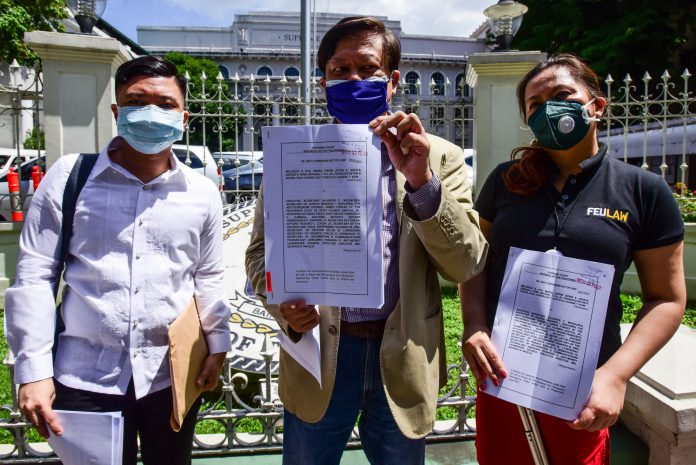Prayers will not save you in the Bar exams.
“Do not write a mantra, motto, prayer to deities or saints, special plea addressed to the examiner or the Bar chairperson, or any other such extraneous text,” Associate Justice Marvic Leonen warned aspiring lawyers.
Leonen said leaving or making any distinguishing mark on any submitted answer is classified as cheating, and can disqualify the examinee from the Bar examinations.
Many aspiring lawyers become more religious during this time, praying hard that they will see their names on the list of successful examinees.
The pandemic gave Bar examinees this year to have a longer time to review after the exams were postponed several times.
The duration of the examinations has also been shortened from four consecutive Sundays to only two days.
The coverage of the exams is also reduced from eight subjects to four sets of examinations. (1) Law Pertaining to the State and its Relationship with its Citizens (formerly Political Law, Labor Law, and Taxation Law); (2) Criminal Law; (3) Law Pertaining to Private Personal and Commercial Relations (formerly Civil Law and Commercial Law); and (4) Procedure and Professional Ethics (formerly Remedial Law, Legal Ethics, and Practical Exercises).
For the first time, the exams will be held in different locations.
“These changes pro hac vice seek to meet the demand for new lawyers amid the disasters plaguing the country,” read a statement from the Supreme Court, adding that the Philippines has produced no new lawyer since the pandemic.
“But while the Bar examinations may no longer be postponed, it can be held in a way that is more humane. With these changes, the Court strikes that balance,” it added.
All examinees were advised to strictly undergo quarantine.
With excitement and trepidation, we pursued the dream of becoming lawyers. Traversing the path of legal education was hard to the exponential power.
We immersed ourselves in law books and cases, faced terror professors, pore through volumes and pages of SCRAs, lined up for photocopying at the law library, hurried through classes, reviewed and crammed through lessons, and survived recitations.
Encounters with law professors during the dreaded recitations involved answers that range from direct lifting from the SCRAs “in the original,” for those who studied, to inventions through guess work for those who didn’t.
Despite the torture, most of the memorable moments in law school were funny blunders during class recitations.
Passing the Bar exams is obviously not that easy, and seems to be the crowning glory of a student’s life. The Bar exam is considered one of the toughest and most difficult among the professional board exams, having one of the highest mortality rate.
Passing is obviously not that easy. The discipline in terms of time management and patience is crucial during the review period.
It is also a yearly spectacle on the performance of law schools measured on the most number of topnotchers, or those scoring the highest passing rate.
I belonged to the working student program of UP Law as a reporter for the TODAY broadsheet and other international news agencies. I did my coverage during the day then attended my evening classes. I read my cases on the bus on the way home to Las Piñas from Diliman, always looking for the seat with the strongest headlight.
I was among the lucky 1,465 examinees who passed, or 39.63 percent out of the 3,697 examinees of the 1998 bar exams, which is considered one of the highest in the bar exam history.
One has to gain an average of 75 percent with no subject falling below 50 percent, otherwise one would be disqualified. I failed in Political Law but my final grade was pulled up by my score in Remedial Law, which was my highest.
I often jokingly tell people that Florin Hilbay topped the 1999 Bar because of the reviewers, which he borrowed from me as his Bar exam buddy. He later became the country’s Solicitor General.
Ultimately, being a good lawyer is another thing. Passing the bar is not enough.
There were those who joined law offices for private practice, the government, judiciary, politics, the academe, while others went into alternative lawyering.
Lawyers, as professionals, are expected to uphold the ethical and moral values that are said to be essential to the fabric that holds society together.
“Serve the people. Do not betray your humanity,” said Leonen, who was my professor. “Discover your passion. Be patient and compassionate.”
Passion for the law is dedication to do what is right.
Dennis R. Gorecho heads the seafarers’ division of the Sapalo Velez Bundang Bulilan law offices. For comments, email [email protected], or call 09175025808 or 09088665786









